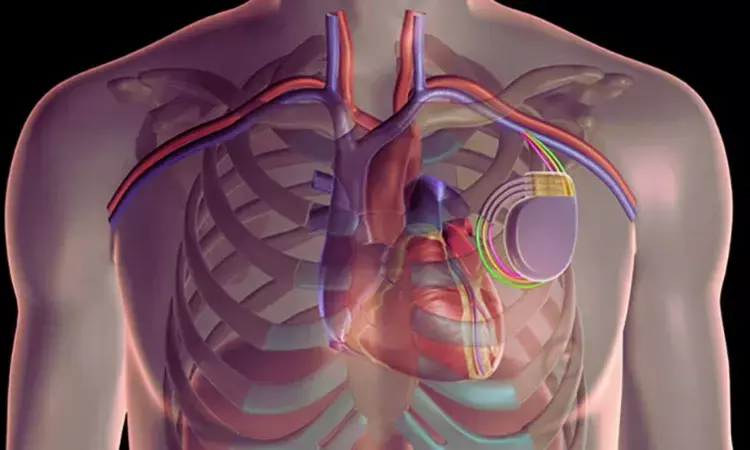- Home
- Medical news & Guidelines
- Anesthesiology
- Cardiology and CTVS
- Critical Care
- Dentistry
- Dermatology
- Diabetes and Endocrinology
- ENT
- Gastroenterology
- Medicine
- Nephrology
- Neurology
- Obstretics-Gynaecology
- Oncology
- Ophthalmology
- Orthopaedics
- Pediatrics-Neonatology
- Psychiatry
- Pulmonology
- Radiology
- Surgery
- Urology
- Laboratory Medicine
- Diet
- Nursing
- Paramedical
- Physiotherapy
- Health news
- Fact Check
- Bone Health Fact Check
- Brain Health Fact Check
- Cancer Related Fact Check
- Child Care Fact Check
- Dental and oral health fact check
- Diabetes and metabolic health fact check
- Diet and Nutrition Fact Check
- Eye and ENT Care Fact Check
- Fitness fact check
- Gut health fact check
- Heart health fact check
- Kidney health fact check
- Medical education fact check
- Men's health fact check
- Respiratory fact check
- Skin and hair care fact check
- Vaccine and Immunization fact check
- Women's health fact check
- AYUSH
- State News
- Andaman and Nicobar Islands
- Andhra Pradesh
- Arunachal Pradesh
- Assam
- Bihar
- Chandigarh
- Chattisgarh
- Dadra and Nagar Haveli
- Daman and Diu
- Delhi
- Goa
- Gujarat
- Haryana
- Himachal Pradesh
- Jammu & Kashmir
- Jharkhand
- Karnataka
- Kerala
- Ladakh
- Lakshadweep
- Madhya Pradesh
- Maharashtra
- Manipur
- Meghalaya
- Mizoram
- Nagaland
- Odisha
- Puducherry
- Punjab
- Rajasthan
- Sikkim
- Tamil Nadu
- Telangana
- Tripura
- Uttar Pradesh
- Uttrakhand
- West Bengal
- Medical Education
- Industry
Adaptive CRT may not reduce HF decompensation or mortality versus conventional CRT among patients with HFrEF and LBBB

USA: A randomised controlled trial comparing adaptive versus conventional cardiac resynchronisation therapy (CRT) in patients with heart failure (HF) revealed that adaptive CRT did not significantly reduce the incidence of all-cause mortality or intervention for HF decompensation. The findings were published in The Lancet on August 24, 2023
The findings from the AdaptResponse showed low death and heart failure decompensation rates with both CRT therapies, indicating a greater response to CRT occurred in this population than in patients in previous trials.
"The AdaptResponse trial showed that in patients with heart failure, left bundle branch block, and intact AV conduction in whom CRT was indicated, adaptive CRT with isolated LV pacing did not reduce the composite outcome of HF decompensation or all-cause death compared with conventional biventricular CRT," the researchers reported.
Continuous automatic optimisation of CRT, stimulating only the left ventricle to fuse with intrinsic right bundle conduction (synchronised left ventricular stimulation), is suggested to offer better outcomes than conventional CRT in patients with HF, normal atrioventricular conduction, and left bundle branch block. Prof Bruce L Wilkoff, Cleveland Clinic, Cleveland, OH, USA, and colleagues aimed to compare clinical outcomes of adaptive CRT versus conventional CRT in HF patients.
The trial was conducted in 227 hospitals in 27 countries across North America, Europe, Australia, and Asia. It included patients aged 18 years or above with class 2–4 heart failure, an EF of 35% or less, left bundle branch block with QRS duration of 130 ms or more (female patients) or 140 ms or more (male patients), and a baseline PR interval 200 ms or less.
3617 were randomly assigned in the ratio of 1:1 to adaptive CRT (an algorithm providing synchronised left ventricular stimulation; n=1810) or conventional biventricular CRT (n=1807) using a device programmer. The primary outcome of the study was determined as a composite of all-cause death or intervention for heart failure decompensation and was evaluated in the intention-to-treat population. In the intention-to-treat population, safety events were collected and reported.
The study led to the following findings:
- A primary outcome event occurred in 430 of 1810 patients (Kaplan-Meier occurrence rate 23·5% at 60 months) in the adaptive CRT group and 470 of 1807 patients (25·7% at 60 months) in the conventional CRT group (hazard ratio 0·89).
- System-related adverse events were reported in 25·0% of patients in the adaptive CRT group and 24·3% of patients in the conventional CRT group.
"Though exploratory, these findings may support a role for adaptive CRT in a subset of patients who are potentially more likely to gain meaningful clinical benefit," the researchers concluded.
Reference:
Wilkoff BL, Filippatos G, Leclercq C, Gold MR, Hersi AS, Kusano K, Mullens W, Felker GM, Kantipudi C, El-Chami MF, Essebag V, Pierre B, Philippon F, Perez-Gil F, Chung ES, Sotomonte J, Tung S, Singh B, Bozorgnia B, Goel S, Ebert HH, Varma N, Quan KJ, Salerno F, Gerritse B, van Wel J, Schaber DE, Fagan DH, Birnie D; AdaptResponse investigators. Adaptive versus conventional cardiac resynchronisation therapy in patients with heart failure (AdaptResponse): a global, prospective, randomised controlled trial. Lancet. 2023 Sep 30;402(10408):1147-1157. doi: 10.1016/S0140-6736(23)00912-1. Epub 2023 Aug 24. Erratum in: Lancet. 2023 Sep 30;402(10408):1132. PMID: 37634520.
Dr Kamal Kant Kohli-MBBS, DTCD- a chest specialist with more than 30 years of practice and a flair for writing clinical articles, Dr Kamal Kant Kohli joined Medical Dialogues as a Chief Editor of Medical News. Besides writing articles, as an editor, he proofreads and verifies all the medical content published on Medical Dialogues including those coming from journals, studies,medical conferences,guidelines etc. Email: drkohli@medicaldialogues.in. Contact no. 011-43720751


